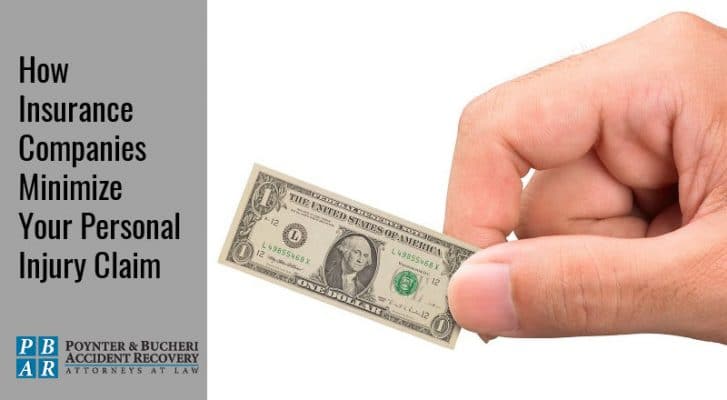
How Insurance Companies Minimize Your Personal Injury Claim

What You’ll Learn Reading This Article
- Why some insurance companies will deny or minimize liability
- How some insurance companies will deny or minimize liability
- Alternative route for personal injury claims
As a result of the stay-at-home orders issued nationwide last year, Indiana experienced a record drop in car accidents. A year later, the country is now reopening, and that means so are the highways and the potential for car crashes.
If you are in a car accident that results in personal injury, use caution when asking an insurance company to file the claim. Not all insurance companies are created equally, and you don’t want to end up feeling worse off after one of your worst times. Here’s why and how some insurance companies minimize your personal injury claim.
Why Insurance Companies Deny or Minimize Liability
The state of Indiana requires bodily injury liability coverage as part of your auto insurance policy. To receive coverage after an accident, you will need to prove the other driver caused the accident and is therefore responsible for your injuries.
Some insurance companies are in the business of protecting their business, which means their ultimate goal is to save money. This means they may look for reasons to deny your claim or to minimize how much is awarded to you. Here are some red flags to be on the lookout for as you navigate life post-accident.
How Insurance Companies Deny or Minimize Liability
Use of Reports
If an insurance adjuster asks you to make a statement about the accident, be wary of the motivation. Some insurance companies may misrepresent the details of your report to hold you responsible for the accident. For instance, they could take your comment that you were “running late for work” as suggestive that you were speeding. So, be careful if such a request is made.
The other reports that an insurance adjuster may misrepresent are police or witness reports. Police officers will question you and any witnesses, compiling information into a cursory police report. In the moments right after a car accident, you may not be aware that what you are saying could be used against you. The insurance company has permission to access the details you provide to the police officer and may use this information to show negligence on your behalf or to assert that there is insufficient proof of fault.
This may result in a denial of compensation, or more often, a quick settlement. The insurance company may offer you money early on, and many people take the money out of fear of not receiving any. If you are offered a fast settlement from your insurance company (particularly after a review of reports), listen to your sixth sense if something doesn’t feel right.You don’t want an adjuster undervaluing the extent of your injuries and personal trauma. You are worth more than that.
Access of Medical Records
Another strategy some insurance companies may use to minimize your personal injury claim is to access your private medical records. They cannot do so unless you authorize it, so you could be asked to sign a medical release form. It’s always good form to wait before you sign any paperwork, particularly a document that grants unlimited access to private information. Pause, take a deep breath, and investigate the purpose behind this request.
The purpose could be two-fold:
1) The insurance company may want to portray your injuries as less serious than they actually are; some companies misuse the information in your medical evaluation or will even hire their own doctor to meet these ends.
2) The insurance company may want to search for pre-existing conditions in your medical records that would weaken the legitimacy of your current medical needs.
The request to sign a medical release form or to undergo an evaluation by a hired doctor, even if presented as mandatory, may not sit well with you. Listen to your gut and get a second opinion.
Review of Activity
Most post-accident people will resume pre-accident activities out of necessity. Knowing this, some insurance companies will send surveyors to review and document your activities. The information they compile could suggest that you are not injured and do not deserve compensation.
Your online presence may also be monitored for the same reason. Some insurance companies will review your social media activity, including photos and posts, to minimize the severity of your injuries. They could even use posted information about the car accident as evidence against you. It’s a good idea to click off Facebook or Instagram following your accident.
Alternative Route for Personal Injury Claims
Did you experience any of the red flags above when using an insurance company to file your claim? If so, consider switching to a personal injury attorney; the only flags they use are the ones they raise in victory at getting the claim you deserve.
A personal injury attorney is a better route for your post-accident needs because there are no hidden motivations. You will benefit from an experienced and professional teammate, one who is a personal extension of yourself. And at Poynter & Bucheri, you will receive just that — experience and professionalism and the best teammate out there!
Poynter & Bucheri Accident Recovery — Indianapolis Personal Injury Attorneys
If you or a loved one has been injured physically or mentally by a person, product, or company, you need to know your legal rights. Our personal injury attorneys are experienced with cases like yours and can evaluate what your case may be worth. We will ensure that you are protected and compensated for your injuries and losses. Why pay up to 40% in attorney fees? Our fee is only 25%*, and we fight to win your case, or you pay no attorney fees at all. Don’t hesitate — one of our experienced attorneys can assist you right away. Call 1-800-265-9881 for a free case review.
